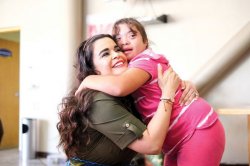Dr. Jennifer Goeke’s Op-Ed for NJ.com: Teachers need help to virtually educate students with disabilities
Posted in: College News and Events

For teachers of students with disabilities, the pandemic is a crisis.
During the abrupt shift to online instruction, they have worked harder than ever before, but with less certainty, they are reaching students whose ways of learning, processing and interacting may not fit neatly into a virtual classroom.
As we face continued virtual or hybrid instruction, there is a serious risk that students with disabilities will be further disadvantaged by an education system that already struggles to meet their needs. It is more critical than ever for teachers to not only have opportunities to learn the skills needed to meet these challenges, but to also receive the necessary support and resources from their respective school districts.
The pandemic has only exacerbated the issues teachers of students with disabilities face at every level of K-12 education. Before, most teachers lacked the confidence to use technology to achieve student learning. Teachers who dabbled in digital learning reported a desire to use it more often but noted challenges such as lack of time, preparation, professional development and support.
Special educators are also under intense pressure to fully implement the designated requirements of each student’s Individual Education Plan (IEP) – plans that were written with in-person teaching in mind. Successfully meeting students’ needs while simultaneously bringing themselves up to speed with technology is an almost impossible task.
Teachers are also asked to consult with parents, who are key members of the IEP team, to help them consider how they may best ensure that students with disabilities have the “necessary supports” for equitable access to virtual instruction.
This means that, in addition to teaching students, special education teachers must be equally adept at teaching parents how to become teachers, therapists and specialists – putting additional strain on parents of young children with disabilities, along with the unfair presumption that they will be willing and able to assume these roles.
Also, common online teaching platforms are often inaccessible or incredibly challenging for students with disabilities, especially those who struggle with organization, attention or social skills. Many online platforms are also not compatible with the assistive technologies students rely on for learning.
So, what can be done?
Teachers urgently need support to develop the skills needed to transfer the best of what they know to the virtual classroom, including:
- Understanding technology as an effective tool for achieving learning goals, including those outlined in a student’s IEP.
- Understanding the legislative and policy mandates for the use of technology for students with disabilities.
- Implementing hardware and software tools to increase student learning, including disability-specific assistive technology applications.
- Applying principles of Universal Design for Learning to virtual curriculum design and instruction so that all learners have access to high-quality teaching.
Whether or not the pandemic continues, all teachers must be better prepared to use technology to meet the unique needs of students with disabilities, with the goal of supporting their academic independence and ensuring their full academic and social participation – whether they are in a physical classroom or a virtual one.
It is up to us as fellow educators to provide them with the training and resources needed to help ensure students with disabilities do not fall further behind.
